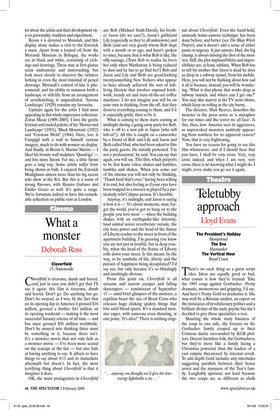What a monster
Deborah Ross
Cloverfield 15, Nationwide
Cloverfield is tiresome, dumb and horrid, and just in case you didn’t get that I’ll say it again: this film is tiresome, dumb and horrid. Don’t go. Do anything but go. Don’t be swayed, as I was, by the fact that on its opening day in America it grossed $16 million, grossed a further $41 million on its opening weekend — making it the most successful January release of all time — and has since grossed $56 million worldwide. Don’t be swayed into thinking there must be something in it, because there isn’t. It’s a monster movie that not only fails as a monster movie — I’ve been more scared on the teacups at the fair — but also fails at having anything to say. It affects to have things to say about 9/11 and its immediate aftermath but doesn’t. In fact, the most terrifying thing about Cloverfield is that it imagines it does.
OK, the main protagonists in Cloverfield are Rob (Michael Stahl-David), his brother Jason (do we care?), Jason’s girlfriend Lily (especially as they’re all unknowns) and Beth (and not very good) whom Rob slept with a month or so ago, and hasn’t spoken to since, because that is what Rob is like, the silly sausage. (Trust Rob to realise he loves her only when Manhattan is being reduced to dust and he has to go find her!) Rob and Jason and Lily and Beth are good-looking twentysomething New Yorkers who appear to have already achieved the sort of loftliving lifestyle that involves exposed brickwork, trendy art and state-of-the-art coffee machines. I do not imagine you will be on your own in thinking, from the off, that they deserve everything coming to them, and if it is especially grisly, then so be it.
What is coming to them starts coming at midnight during a going-away party for Rob, who is off to a new job in Japan (who will loft-sit?). All this is caught on a camcorder by a friend of Rob and Lily and Jason and Beth called Hud, who had been asked to film the party guests. He initially protested. ‘I’m not a professional,’ he said. You can say that again, you will say. This film, which purports to be that home video, shakes and tumbles, tumbles and shakes. When you come out of the cinema you will not only be thinking, ‘Thank God that’s over,’ having been willing it to end, but also feeling as if your eyes have been trapped in a maraca as played by a particularly wild Calypso person. It’s horrible.
Anyway, it’s midnight, and Jason is saying it how it is — ‘It’s about moments, man; forget the world, you’ve got to hang on to the people you love most’ — when the building shakes with an earthquake-like intensity, loud animal noises reverberate outside, the city loses power and the head of the Statue of Liberty crashes to the street in front of the apartment building. I’m guessing you know you are not just in trouble, but in deep trouble, when the head of the Statue of Liberty rolls down your street. Is this meant, by the way, to be symbolic of life, liberty and the pursuit of happiness being decapitated? I’d say yes, but only because it’s so blindingly and insultingly obvious.
From this point on, Cloverfield is all screams and narrow escapes and falling skyscrapers — reminiscent of September 11 — amid brief glimpses of the monster, a reptilian beast the size of Brent Cross who releases huge clicking spidery things that bite until blood spurts. It’s a standard monster caper, with someone even shouting, at one point, ‘It’s alive!’ There is nothing origi nal about Cloverfield. Even the hand-held, unsteady home-camera technique has been done before, and better (see The Blair Witch Project), and it doesn’t add a sense of either panic or urgency. It just annoys. Hud, the big chump, is always missing the shot of the monster. Still, the plot implausibilities and impossibilities are, at least, sublime. When Rob has to tell his mother that Jason is dead he does so deep in a subway tunnel, from his mobile. Here, you will not be thinking about how sad it all is because, instead, you will be wondering, ‘What is that phone that works deep in subway tunnels, and where can I get one?’ You may also marvel at the TV news shows, which keep on rolling as the city burns.
The director, Matt Reeves, describes the monster in the press notes as ‘a metaphor for our times and the terror we all face’. Is this, then, how America sees its aggressors, as unprovoked monsters suddenly appearing from nowhere for no apparent reason? Now, that is very frightening.
You have no reason for going to see this film whatsoever, and if I should hear that you have, I shall be very cross. Very, very cross indeed, and when I am very, very cross, there is no knowing what I might do. I might, even, make you go see it again.


































































 Previous page
Previous page